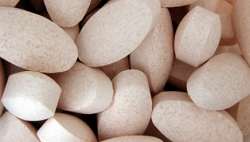
Did you know, our bodies are 1.5% calcium, making it the most abundant mineral in our bodies? Obviously, most of this is locked up in our bones, but it has many important functions elsewhere in your body as well. The level of calcium in your blood is critical, and is closely protected and monitored by your kidneys, which use vitamin D to help them keep on top of things.
In fact, making sure you have enough vitamin D in your diet seems more important than having enough calcium when it comes to maintaining strong, healthy bones. When it comes to hip fractures, for example, countries which have a high calcium intake have no advantage over those with a low calcium intake. While the benefit of calcium is doubtful when it comes to avoiding breaking a bone when you fall, vitamin D and calcium are thought to reduce your chance of falling in the first place, which is always good!
Vitamin D is available from food sources such as oily fish, meat, egg yolks and some cereals or breads that have been fortified with it. In the presence of sunlight, our body can also make vitamin D, but in the winter months (or the summer, it sometimes feels like!) our little island simply doesn’t get enough sunlight. If we don’t get enough vitamin D, our calcium levels are at risk of falling and our bodies will actually resort to stealing the calcium in your bones to make sure that there is enough in your blood.
Having said that, it seems hard to get enough vitamin D from dietary sources if there is insufficient production through sunlight. So maybe there is an argument for supplementation – take a vitamin D tablet to make sure you have enough?
The trouble is, we don’t know how much is ‘enough’. We know there is ‘too little’ (diseases such as osteomalacia and rickets are the result) and sadly we know there is ‘too much’ (shortly after World War II they started supplementing baby formula milk with vitamin D, overdosing the babies and leading to several fatalities), but we just don’t know the Goldilocks number of ‘just right’. In the UK, we are recommended to have around 10 micrograms (micro, not milligrams!) per day, but in Europe and America the figure is much higher.
As is so often the case when it comes to health and nutrition, balance is key. As long as you make the right food choices across your whole diet, you are giving yourself the best chance possible or avoiding the pitfalls of poor nutrition. An immeasurably complex issue which can baffle even the highest expert minds has no perfect answer, and it is simply not something you can grapple with while trying to get your weekly shop done, but the basic principles of a high quantity and variety of fruit, vegetables, nuts and seeds, minimal red and processed meat, plenty of oily fish, low sugar, low salt, low saturated fat and always going for wholegrain options is far more achievable.
Search
Shifnal Chiropractic Newsletter
Find Us
Contact
Copyright @ 2024